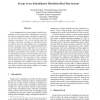Free Online Productivity Tools
i2Speak
i2Symbol
i2OCR
iTex2Img
iWeb2Print
iWeb2Shot
i2Type
iPdf2Split
iPdf2Merge
i2Bopomofo
i2Arabic
i2Style
i2Image
i2PDF
iLatex2Rtf
Sci2ools
129
click to vote
IPPS
2003
IEEE
2003
IEEE
Energy Aware Scheduling for Distributed Real-Time Systems
Power management has become popular in mobile computing as well as in server farms. Although a lot of work has been done to manage the energy consumption on uniprocessor real-time systems, there is less work done on their multicomputer counterparts. For a set of real-time tasks with precedence constraints executing on a distributed system, we propose new static and dynamic power management schemes. Assuming a given static schedule generated from any list scheduling heuristic algorithm, our static power management scheme uses the static slack (if any) based on the degree of parallelism in the schedule. To consider the run-time behavior of tasks, an on-line dynamic power management technique is proposed to further explore the idle periods of processors. By comparing our static technique with the simple static power management, where the static slack is distributed to the schedule proportionally, we find that our static scheme can save an average of 10% more energy. When combined with d...
Distributed And Parallel Computing | IPPS 2003 | Power Management | Power Management Scheme | Static Power Management |
Related Content
| Added | 04 Jul 2010 |
| Updated | 04 Jul 2010 |
| Type | Conference |
| Year | 2003 |
| Where | IPPS |
| Authors | Ramesh Mishra, Namrata Rastogi, Dakai Zhu, Daniel Mossé, Rami G. Melhem |
Comments (0)

